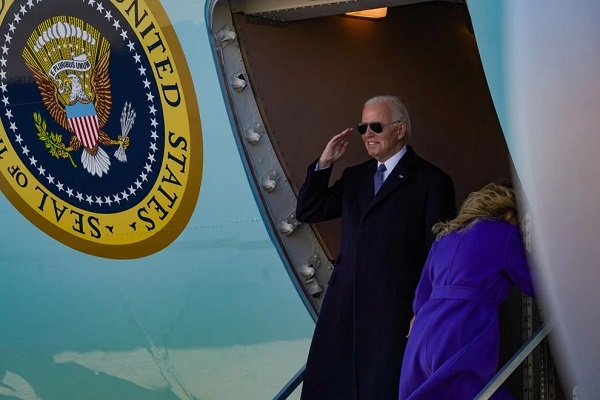Energy
Trudeau government doubles down on unaffordability – Carbon Tax set to increase April 1st

From Canadians for Affordable Energy
 Written By Dan McTeague
Written By Dan McTeague
The Trudeau government’s Net Zero carbon tax is set to increase once again on April 1st. This increase of 23% will, of course, mean higher fuel prices. Canadians can expect on average to pay an additional 3.5 cents per litre in gasoline and 4.5 cents per litre in diesel. So Canadians will spend on average almost 20 cents per litre more every time we fill up our family vans, work trucks, or commuter cars, all because of the carbon tax. Moreover, this increase will also be felt across-the-board, in all of life’s necessities, from food prices to heating costs.
According to CEA President Dan McTeague, “despite multiple pleas from premiers across the country to at least push back the increase, the Trudeau government continues to double down on this punitive and costly tax.” He added, “They are so beholden to their Net Zero green ideology that they are blinded to the struggles of everyday Canadians.”
CEA conducts daily gas price predictions for major centres across Canada. According to our predictions on Saturday, gas prices will go from $1.56.9 to $1.62.9 on Monday, April 1st in Toronto as a result of this carbon tax hike.
Other areas will see prices that will jump as a result of the carbon tax hike on April 1st:
Ottawa $1.56.9 to $1.62.9
Winnipeg $1.39.9 to $1.43.9
Regina $1.54.9 to $1.58.9
Vancouver $2.01.9 to $2.07.9
Alberta will be hit even harder with the reintroduction of the provincial gas tax on April 1st. Calgary will go from $1.54.9 to $162.9 and Edmonton from $1.51.9 to $1.59.9.
The carbon tax will continue to increase every year until it hits $170 a ton by 2030. That is more than double the current rate. “This tax is trying to fundamentally alter the way Canadians live. It is designed to punish them for carrying out everyday activities like driving to work and heating their homes. It’s unconscionable for this government to continue hurting Canadians in this way. It’s time to axe the carbon tax and scrap Net Zero.”
Keeping energy services affordable must be an ongoing public policy priority for all levels of government. Founded in 2016, Canadians for Affordable Energy is a not-for-profit organization committed to speaking out on this issue so there is an informed debate, and the interests of all Canadians are heard.
Energy
Who put the energy illiterate in charge?

This article supplied by Troy Media.
Canada’s energy policy is being shaped by politicians who don’t actually understand how energy works. That’s not just embarrassing. It’s dangerous
Canada’s energy future is being held back by a critical obstacle: our elected officials don’t understand energy.
At all three levels of government, most politicians lack even a basic grasp of how our energy systems function. That ignorance isn’t just a knowledge gap—it’s a leadership crisis. Energy systems are evolving rapidly, and our leaders are ill-equipped to manage the complexity, tradeoffs and consequences involved. With few exceptions, their understanding is superficial, shaped more by talking points than substance.
By “energy systems,” I mean the complex web of technologies, infrastructure, markets and regulations that generate, distribute and manage power—from oil and gas to hydro, nuclear, wind and solar. These systems are deeply interconnected, constantly changing and central to every aspect of modern life. Yet the people making decisions about them often have little idea how they actually work.
This shows up frequently in public life: dodged questions, scripted answers, vague platitudes. Many politicians skate across the surface of issues with the thinnest understanding. The old adage “a little knowledge is a dangerous thing” perfectly describes Canadian energy politics today.
Decisions about energy directly affect household utility bills, climate goals, industrial competitiveness and grid reliability. Yet politicians tend to be tethered to the dominant energy source in their own region—oil and gas in Alberta, hydro in Quebec, nuclear in Ontario—without grasping how those systems connect or conflict. Canada’s energy landscape is fragmented, with each province operating under its own regulatory framework, infrastructure constraints and political pressures. That makes coordination difficult and systems-level thinking essential.
This isn’t a left-versus-right issue. It’s not oil and gas versus renewables. It’s a national failure to understand the integrated systems that power our lives and economy. Canada is, functionally, energy illiterate, and our elected officials reflect that reality. We flip a switch, pump gas, turn up the thermostat and rarely ask how or why it works, or what it costs in environmental or economic terms.
Take the Clean Electricity Regulations as one example. Introduced by the federal government to drive Canada’s electricity grid to net-zero emissions by 2035, the CERs require provinces to sharply reduce or eliminate fossil fuel-based power. But in Alberta and Saskatchewan, where coal and natural gas still dominate, those regulations landed with a thud. The federal government failed to account for regional infrastructure limitations, market structure
differences and technology readiness. The result? Immediate backlash, legal threats and political gridlock—not because climate action is unwelcome, but because the policy was crafted in a vacuum of systems-level understanding.
Adding to the problem is the dominance of bureaucrats and political handlers in shaping what passes for energy messaging. Speeches are often a patchwork of statistics and sanitized clichés, stripped of nuance or depth. Many politicians simply deliver what they’re handed, guided more by risk management than insight. The result is policy that’s disconnected from the realities it aims to change.
A handful of elected officials do have real-world energy experience, but even that is often narrow, based on one role or one sector. It rarely translates into the kind of broad, integrated knowledge needed to lead across multiple interdependent systems. The risks of this fragmented thinking are immense.
What’s needed is mandatory education—an energy information and insights toolkit for anyone seeking public office. This shared curriculum would cover how electricity and fuel systems work, the economics of energy markets, climate dynamics, environmental trade-offs and public policy principles. It should be grounded in both natural and social sciences and structured to develop systems thinking, so that decisions are informed by how energy technologies, markets and governance truly interact.
Imagine if thousands of politicians—urban and rural, left and right, federal and local—learned from the same textbook. Politics wouldn’t vanish. Disagreements wouldn’t disappear. But the debate would shift from tribal talking points to informed discussion.
And for once, Canada might start moving forward on energy, not with noise or paralysis, but with purpose.
Bill Whitelaw is a director and advisor to many industry boards, including the Canadian Society for Evolving Energy, which he chairs. He speaks and comments frequently on the subjects of social licence, innovation and technology, and energy supply networks.
Troy Media empowers Canadian community news outlets by providing independent, insightful analysis and commentary. Our mission is to support local media in helping Canadians stay informed and engaged by delivering reliable content that strengthens community connections and deepens understanding across the country.
Daily Caller
Unanimous Supreme Court Ruling Inspires Hope For Future Energy Project Permitting


From the Daily Caller News Foundation
It comes as a surprise to many Americans when they learn that the vast majority of decisions issued by the U.S. Supreme Court are decided unanimously. Far too often, these unanimous decisions receive scant attention in the press due to their lack of controversy.
Such is the case with a key 8-0 decision the Court published May 29 that could help Congress and the Trump administration meet their goals to streamline permitting for energy projects in the United States. The decision narrows the scope of application of the National Environmental Policy Act (NEPA), a law whose environmental review provisions have been systematically used – and often abused – by climate alarm groups and plaintiff lawyers for decades to impede the progress of major projects of all kinds.
The case at hand involves the Uinta Basin Railway Project, which will transport oil produced in Utah’s Unita Basin and connect it to the national railway network so it can reach national markets. Because the rail line would parallel the Colorado River for roughly 100 miles, the D.C. Court of Appeals ruled in 2023 that the project’s developers would have to conduct a second, expanded environmental impact study under NEPA to try to assess nebulous potential impacts to air quality – often taking place thousands of miles away – or from a possible oil spill, rescinding a key permit that had been issued in 2021 by federal regulators.
Dear Readers:
As a nonprofit, we are dependent on the generosity of our readers.
Please consider making a small donation of any amount here.
Thank you!
It is key to note that that permit was issued by the federal Surface Transportation Board (STB) along with a 3,600-page environmental impact statement to comply with NEPA. In the conduct of the environmental review, the Wall Street Journal wrote that STB and the company assessed “the railway’s potential effects on local water resources, air quality, protected species, recreation, local economies, the Ute Indian tribe and much more.”
But for the plaintiffs and the D.C. Circuit Court, 3,600 pages of thorough scientific analysis just weren’t enough. They filed suit, complaining that the study didn’t try to assess potential impacts that might happen on dozens of other rail lines hundreds of miles distant, or, even more absurd, assess potential pollution in “environmental justice communities” as far away as the Texas and Louisiana Gulf Coast.
You really can’t make this stuff up.
If delay was the goal, the plaintiffs got a win, halting progress for four years. That is a sadly typical outcome for cases involving energy-related projects such as this one.
In their unanimous opinion written by Justice Brett Kavanaugh, the justices state, “The goal of the law is to inform agency decisionmaking, not to paralyze it.”
As I’ve written in previous stories, the vast majority of delays in permitting processes stem from provisions contained in major federal statutes designed to protect the environment and endangered species. In addition to NEPA, these laws include the Clean Air Act, the Clean Water Act and the Endangered Species Act. Among them all, none has been more broadly abused and misinterpreted by activist courts than NEPA.
In its analysis of the decision, the Institute for Energy Research says, in part, that the “decision means that agencies can approve projects like pipelines, railways, and dams and not be mandated to consider distant environmental effects of the projects, such as increased greenhouse gas emissions, that had stopped or delayed fossil fuel projects from moving forward, particularly during the Biden administration.” But, the author cautions, “the Uinta Basin Railway project could still face additional legal and regulatory hurdles within Colorado,” despite the ruling.
The good news is that even the liberal justices on the Supreme Court appear to be developing a growing awareness of just how absurd some of the claims made in lawsuits like this case really are. The unanimous nature of this decision inspires some sense of hope that the Trump administration can succeed in some of its efforts to reform the system and put an end to some of the most unjustified delays.
David Blackmon is an energy writer and consultant based in Texas. He spent 40 years in the oil and gas business, where he specialized in public policy and communications.
-

 Alberta2 days ago
Alberta2 days agoCentral Alberta MP resigns to give Conservative leader Pierre Poilievre a chance to regain a seat in Parliament
-

 Alberta23 hours ago
Alberta23 hours agoUnified message for Ottawa: Premier Danielle Smith and Premier Scott Moe call for change to federal policies
-

 Alberta2 days ago
Alberta2 days agoAlberta pro-life group says health officials admit many babies are left to die after failed abortions
-

 Business21 hours ago
Business21 hours agoCanada’s critical minerals are key to negotiating with Trump
-

 International15 hours ago
International15 hours agoJudiciary explores accountability options over Biden decline ‘coverup’
-

 Alberta1 day ago
Alberta1 day agoCalls for a new pipeline to the coast are only getting louder
-

 Business14 hours ago
Business14 hours agoRFK Jr. planning new restrictions on drug advertising: report
-

 Education1 day ago
Education1 day agoStudents can’t use AI to cheat on standardized tests







